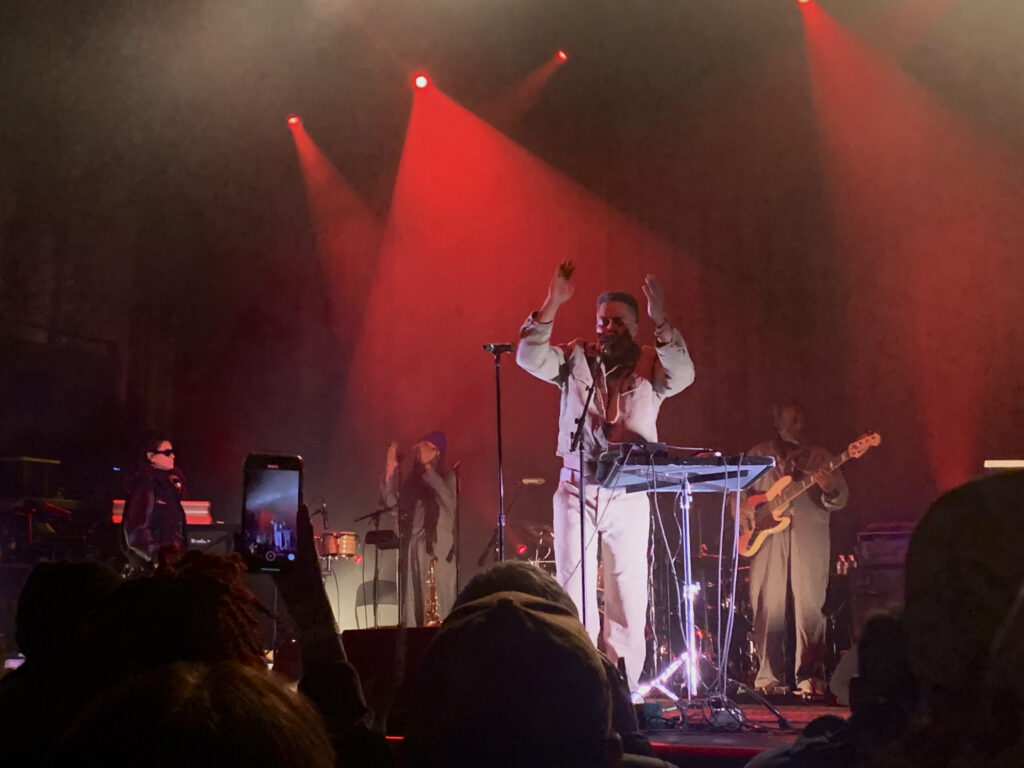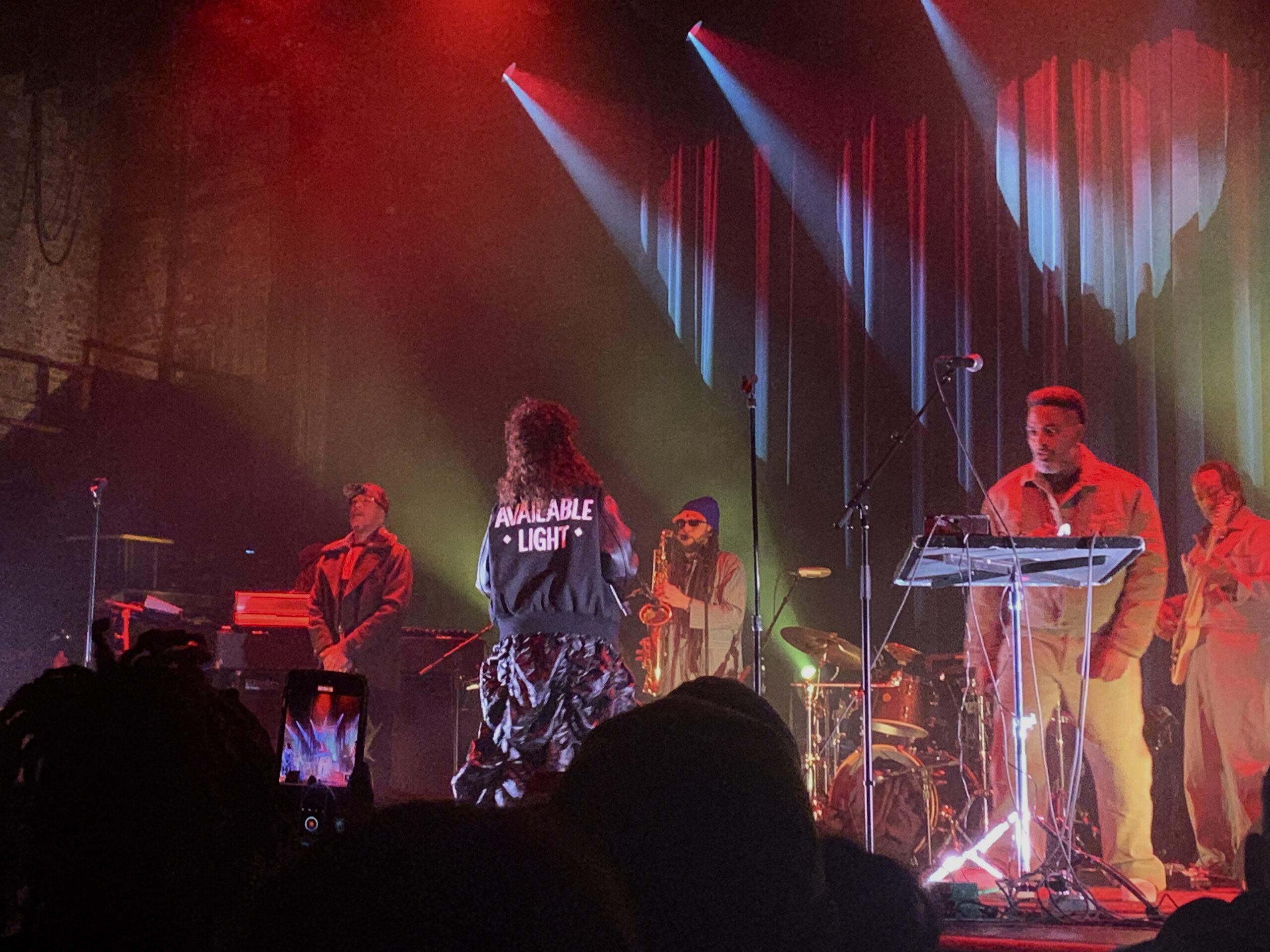CHICAGO | Standing outside of Thalia Hall in Pilsen, I self diagnosed myself with a raging case of imposter syndrome. I could not grapple with the fact that in a couple of hours, I, Dara Carneol, freshman at DePaul University, was about to conduct my first ever interview with the legendary hip hop group, Digable Planets.
Composed of Isaiah “Butterfly” Butler, Craig “Doodlebug” Irving and Mariana “Ladybug Mecca” Rivera, the Brooklyn based trio is the epitome of old school hip hop — combining smooth jazz elements such as slower beats and trumpet riffs with their smooth vocals. On their 30 year anniversary tour of their debut album, Reachin’ (A New Refutation of Time and Space), the Planets played a sold out show with Kassa Overall, a jazz drummer, as the opener who later joined them on stage for their set.
Upon arriving at the venue, I had no idea of what the age demographic of the audience would be. With the “tiktokification” of one of their songs, “Cool Like Dat,” I expected there to be a mix of generations, however, the young people were sparse. Fortunately, I spotted some Gen Z-ers in the crowd — Miles and Carolyn — and wanted to get their dig on Digable Planets. Miles mentioned that he “grew up on A Tribe Called Quest” and that his parents played a lot of their music.
After an incredibly smooth set from Kassa containing many hits from a spiral cymbal, giving the set a mellow, atmospheric effect, the planets emerged with Ladybug wearing a reflective trash bag skirt with a jacket that read “Available Light.” They played the classics such as “Where I’m From,” “Jettin”, “Pacifics” and “Nickel Bags,” while in between songs, the Planets would turn it over to their band, resulting in electrifying bass and drum solos. I was particularly struck with the song “Escapism (Gettin’ Free)”, with a snappy earworm of a post chorus; “Funk is you, funk is me, funk is us, funk is free.”
Upon further research, this hook is a shout out to The Last Poets, a hip hop trio from the late 60s, who spoke out against racism, poverty and other African American societal concerns. Their song “Black Is” is a spoken word meditation on Black empowerment, with a constant rise of “Black is you, black is me, black is us, black is free” in the background. After 30 years, the Planets still know how to orbit.

Following the show, Doodlebug and Butterfly immediately came out from the “Employees Only” doors and started taking pictures with starstruck fans. Armed with an iPhone and microphone that we couldn’t figure out how to use, Aden Van Hollander and I, the promotions director here at Radio DePaul descended down into the basement where the Planets graciously allowed us to conduct a short interview. All the nerves that I had dissipated, after seeing how kind the Planets were, opening doors for us and treating us with importance.
After 30 years starting from the age of cassettes and walkmans to blowing up on tik tok in the digital age, Digable Planets echoes the last tidbit Butterfly provides in the interview…
Butterfly: A great quote is the more things change, the more they stay the same.
What does 30 years of Digable Planets mean to you?
Butterfly: “We both got like kids that we like to spend a lot of time with and hang out with — a lot in that family type situation at home. But making music and touring, doing shows was a dream that we’ve had since we were young. So to be able to do it now — and fortunately our families really support us too, they come to the shows whenever we’re in the area, even travel sometimes — it’s like a good energy that we just feel blessed to be able to continue to do.
Sometimes it’s unbelievable, like on nights like this where we’ve got a sold out crowd and all that type of s—t. It’s just, you know, when you are a kid you literally dream… daydream and night dream about this type of thing. So to be able to do it, it’s like living a dream – so it’s very special.”
You guys started making your music in the 80s and the 90s which were two very different decades of music. Did they affect your sound in different ways?
Doodlebug: “The eighties was my main foundation, to be honest with you. That’s where I really got enamored; the passion for hip-hop, the culture, really seamed into my soul. So that whole eighties era was the era that really shaped me. Even though I’m, I’m malleable enough to go to different eras and, and, and flow of whatever I like. You know what I’m saying, what I’m feeling?
But the eighties was mine. That was my foundation; Run DMC, LL Cool J… that was my era. That made me get into hip-hop and figure it out, and then from there as the decades went on, I just flowed with it. Now I have kids that keep me in tune with what’s new; my son and daughter would be like, ‘Yo, check this out.’
Some of it’s a’ight, some of it, I ain’t gonna f—k with, but some of them I definitely do f—k with.”
Are there any specific modern artists you want to shout out?
Butterfly: “Oh man… Little Tracy, shoutout Uzi, Brief the Lost Cause.
Doodlebug: I mean, nowadays, you could say you like a certain style. Like I could say I like Detroit or new Detroit, you know what I mean? And everybody got a type of similar flow; there’s different guys, I like Bezo, you know what I’m saying, I mean I like that style of music.
I mean, we like it all man, honestly, because we never – we stopped doing the genre thing a long time ago because it’s just not really a thing. It’s just a marketing thing, you feel me?
Music is music.
When I was growing up, when we would go to a party, there wasn’t just a Hip-Hop party or a House music party, but like you hear all that s—t.
You might hear a f—king Black Sabbath song or a f—king Run DMC, you know what I’m saying? Just all types of shit; Earth, Wind, & Fire, all played all night just because that was what we was into.
Now that you guys have kids, how does it feel to see younger faces in the crowds of your shows?
Butterfly:“It’s magical. Because you start to realize like all the things you believed about music. ‘Oh, music is timeless. Music is cross generational.’
Then you start to remember too, our parents’ music, The Temptations, Motown stuff and all that. We actually like that music, we love it to this day — so music just seeps over and leaks into the next generation.
It’s a blessing because they keep you alive. The younger people — ’cause they are active in the marketplace; they come to the shows, they do social media and stuff, so young people are integral. The fact that they f—k with us, think about us, it’s good, it helps. And we feel good about that.”
A lot of people know your song Cool Like Dat, because of tik tok. How do you feel about it? Is it a positive or a negative?
Doodlebug: It’s all positive. (“It’s all positive” echoed by Butterfly.)
Doodlebug: I’m not on TikTok, so I don’t know about TikTok that much — I know about it, but I’m not on it.
But that’s positive, you know what I’m saying?
Anytime somebody or another generation is playing your music and spreading it out to a whole, [or to] some people that may have never listened to it, or wouldn’t be exposed to it otherwise; that’s cool as shit.”
Brooklyn is an integral subject of the Digable Planets Discography. In the 30 years you’ve been making music, how has Brooklyn changed or stayed the same? And if it’s changed, are the changes for better or for worse?
Doodlebug: “I mean, the Hip-Hop scene is basically the same. The thing that changed the most is the marketing; the way it’s pushed out to you.
Back in the day, everybody would go to a record store, dig through the crates… find that vinyl cassette, you know what I’m saying?
Nowadays, you just go to Spotify or Apple Music or Tidal or wherever you go to get music… It’s a different way, you know what I’m saying?
So in that way, I mean, it’s kind of different — but other than that the culture itself, Hip-Hop and what inspires it and what makes people wanna make music is still the same. Same elements; poverty, partying, revolution … whatever’s on your mind, you know what I’m saying?
That s—t is still relevant and evident today as it was back in the eighties.
After 30 years starting from the age of cassettes and walkmans to blowing up on tik tok in the digital age, Digable Planets echoes the last tidbit Butterfly provides in the interview…
Butterfly: “A great quote is the more things change, the more they stay the same.”
All photos taken by Dara Carneol.
